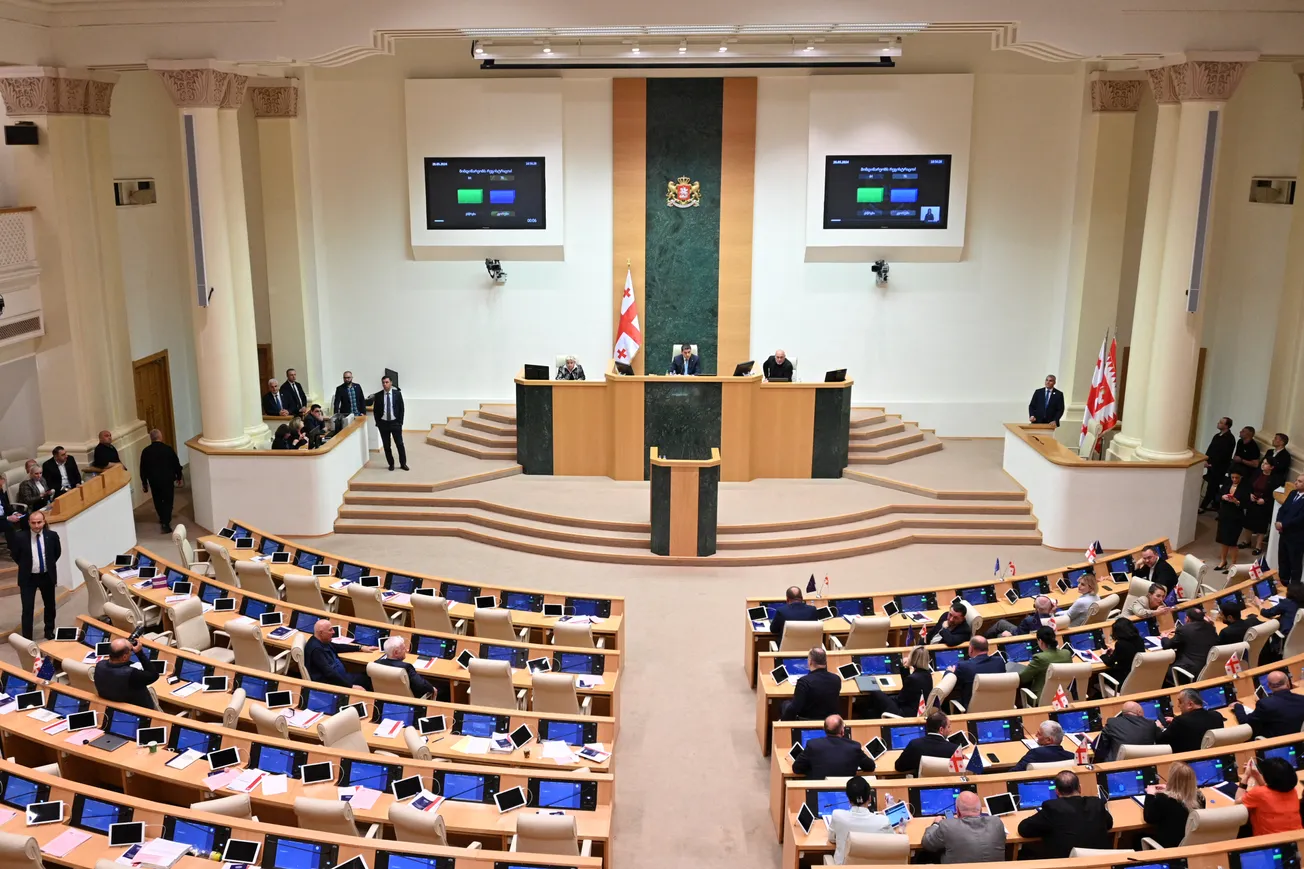For people who want a replay of the events in Kyiv, Ukraine, in 2014, Tbilisi, Republic of Georgia, is the place to go.
On Tuesday evening, the Georgian Parliament secured the so-called Law on Transparency of Foreign Influence.
All the major Western powers had lobbied hard to prevent the proposal from becoming law. The European Union threatened Georgia, which now has "Candidate" status to be welcomed to the E.U. at a future date, that it risks having that status withdrawn. The United States did what it always does—it sanctions those it believes are responsible for pushing a law it opposes, even if the law is in a different country. "In response to these actions, the Department of State is implementing a new visa restriction policy for Georgia that will apply to individuals who are responsible for or complicit in undermining democracy in Georgia, as well as their family members."
The Georgian Parliament ignored these threats and pushed forward with the passage of the law. Western efforts then turned to President Salome Zourabichvili, who vetoed the law on May 18, but an override vote was imminent. That vote happened on Tuesday evening. The margin of votes to override the veto, at 84- 4, was overwhelming, bringing a stinging defeat to the West.
At issue for the West is one of the law's provisions that requires mass media organizations (broadcasters, print media outlets, internet domains) receiving foreign funding to be labeled as "agents of foreign influence" if such support constitutes over 20% of their total revenue in the previous year. The West has always lined its sights on Georgia, going back to Bush 43, who had aggressively pursued its inclusion into NATO only to be overruled by Germany and France at the time.
The new Georgia law introduces obligations for organizations labeled as foreign agents and expands the Ministry of Justice's supervisory powers. Violating the law's requirements can result in harsh penalties, equivalent to more than $9,000 per incident.
So, what happened in Kyiv during the previous decade?
On June 3, 2010, under the leadership of then-President Moscow-friendly Viktor Yanukovich, the Ukrainian Parliament approved a bill barring the country from joining NATO. It returned the nation to its professed goals in its Declaration of State Sovereignty of becoming a neutral state.
In late 2013, Victor Yanukovich sought to strengthen trade relationships with Russia. But, the European Union wanted Kyiv and its liberal elite to expand trade relations with the West. Protests then broke out in Kyiv to pressure Yanukovich.
Then-Vice-President Biden, Obama's point man on Ukraine, called on his buddies in the Senate, Chris Murphy of Connecticut, and John McCain of Arizona, to visit Kyiv to show support to the pro-Western faction. They were the first U.S. senators to land in Kyiv in December 2013. Teams of dedicated Foreign Service members, U.S. government employees from various agencies, eligible family members, and locally employed staff were present during the protests. Western intelligence agencies like the CIA and MI6 helped Maidan protesters, and President Yanukovich ordered the police to crack down on the protests.
In February 2014, an intercepted phone conversation between Victoria Nuland, the Assistant Secretary of State for European Affairs, and Geoffrey Pyatt, the U.S. Ambassador to Ukraine, revealed that the U.S. had clear ideas about the desired outcome in Ukraine and was actively involved in shaping the events of a foreign nation.
According to Reuters, Joe Biden called President Viktor Yanukovich in February 2014 for the second time in three days and delivered a blunt message: "Pull back your security forces now and accept a European-brokered settlement, or you will be held accountable," Biden warned the pro-Russian leader. "It will catch up with you." It was an extraordinary level of intervention in the affairs of a foreign state.
Reuters reported that, while initially defiant, Yanukovich sounded subdued by the end of the hour-long call, according to a senior U.S. official knowledgeable of the conversation. Within hours, Yanukovich signed a deal with the opposition and fled to Russia on February 21, 2014.
On February 25, 2014, Chris Murphy spoke to C-SPAN, where he was almost boastful about America's interference in a foreign country:
I think it was our role, including sanctions and threats of sanctions, that forced, in part, Yanukovych from office.
Sen. Murphy went on:
If, ultimately, this is a peaceful transition to a new government in Ukraine, it will be the United States on the streets of Ukraine who will be seen as a great friend in helping make that transition happen.
Georgians have seen how Ukraine has become an American slave state, utterly dependent upon the West for financial and military aid in a standoff with Russia that it never wanted to pursue for so long. Two months after Russia invaded Ukraine, both parties agreed in Istanbul that Russia would withdraw if Ukraine agreed to remain neutral. Western influence led by the United States and the United Kingdom scuttled the deal.
Most parliamentarians in Tbilisi did not want a replay of Kyiv in their country. While many young Georgians aspire to be allied with the West, older populations wish to continue their country's relationship with Russia.
The New York Times reported that Prime Minister Irakli Kobakhidze, a supporter of the foreign agent law, thanked Parliament for overriding the presidential veto. Speaking at a news conference, he said the measure would help Georgia achieve "peace and stability" and avoid "radicalization and constant attempts to stage revolutions," a clear reference to Kyiv in 2014.
We can understand why a government leader would want to protect his country's sovereignty. Western leaders, after all, repeatedly remind us that Russia's invasion of Ukraine was an attack on the latter's sovereignty.







